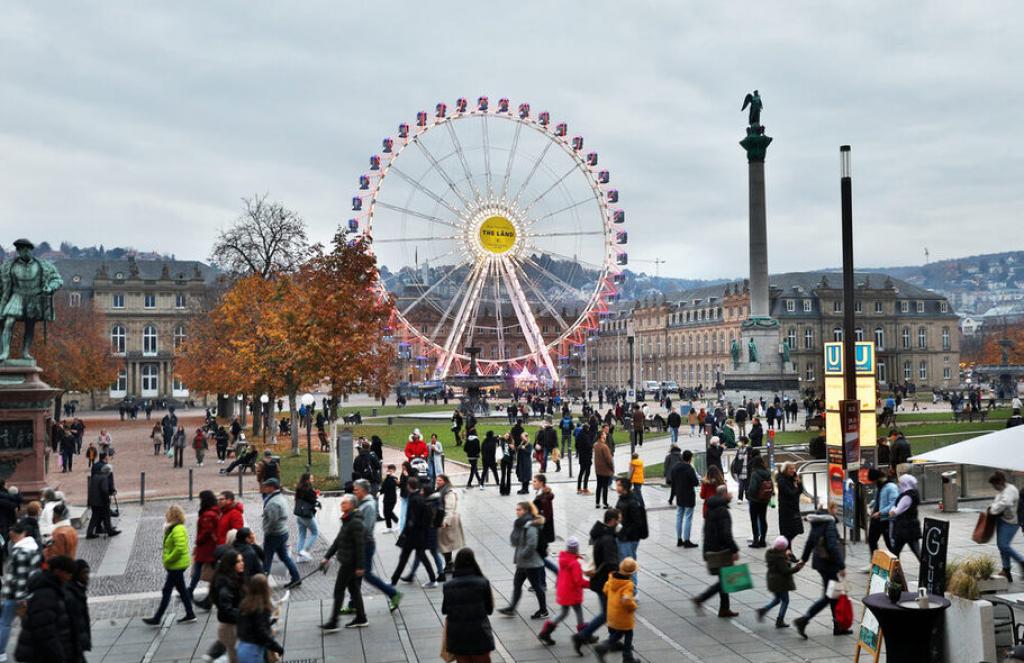Thessaloniki gets ready for its metro launch in November
The underground rapid transit lines have been under construction for almost two decades due to various project delays
 TheMayor.EU logo
TheMayor.EU logo 
More than 9,000 citizens have beeh interviewed for the Citiznes' Study in Stuttgart, Source: City of Stuttgart
An important tool for local lawmakers to capture the citizens’ experiences in the city before they vote on the next budget
According to the annual Citizens’ Survey in Stuttgart, Germany, published yesterday, the quality of life in the city remained relatively unchanged during the pandemic. The Citizens' Survey is an important tool for the local administration to gauge the effectiveness of policy changes and priorities. It has been an integral part of Stuttgart’s decision-making process and budgeting priorities since 1995.
The survey was issued to 9,241 people between April and June placing it right as the third wave of the COVID-19 pandemic was starting to calm down and amid strict social distancing measures. According to Dr Mathias Fatke, the head of the Statistical Office, this offered researchers a chance to capture the mood shaped by the pandemic.
In terms of quality of life in 2021, Stuttgart was rated ‘very good’ by 15% of the participants and ‘good’ by a further 62%. This is just one point below the 2019 values. On the other hand, the question about whether citizens would like to continue to live in Stuttgart or would move somewhere else can be an important indicator for long-term living arrangement satisfaction.
It also reflects an emotional attachment to the city. A good 79% said that they like living in Stuttgart, which is just a 4% drop compared to 2017.
Moreover, in order to unpack those answers, the study asked participants to go into further detail in a total of 29 areas. Respondents were most satisfied with shopping opportunities and work opportunities, while they were most dissatisfied with parking in the city centre and housing supply/housing market. The last point is no surprise, considering Stuttgart is one of the priciest cities in Germany.
On the other hand, the survey also asked citizens to outline the biggest problems in the city. Here, housing also takes the top spot, both in terms of pricing and supply. That is followed by other usual suspects, such as too much traffic and insufficient parking spaces.
Some prominent newer issues make a significant appearance in this section, such as the dissatisfaction with increasing right-wing extremism, increasing left-wing extremism and xenophobia. These issues have become more significant to the public, compared to most other areas.
At the end of 2021, authorities in Stuttgart will adopt the budget for 2022/2023, which also includes the participatory budget – a portion of the city’s funds that will be allocated towards projects voted on by the citizens.
The survey allows citizens to present their main budget priorities, giving important and direct feedback to lawmakers about the priorities in next year’s agenda. It lists 32 areas, where citizens can decide whether to increase spending, decrease spending or leave it alone.
An overwhelming majority (82%) would like an increase of spending for housing, followed by schools (72%), then kindergartens (70%). At the same time, there was no consistency among the citizens on which areas should see reduced spending. Nevertheless, the largest portion of participants (35%) listed the expansion of the road infrastructure as their priority for cutting costs.

The underground rapid transit lines have been under construction for almost two decades due to various project delays

Now you can get your wine in Talence by paying directly in Bitcoin

That’s because the state has to spend money on updating the railway infrastructure rather than subsidizing the cost of the popular pass

Rethinking renewable energy sources for the urban landscape

The examples, compiled by Beyond Fossil Fuels, can inform and inspire communities and entrepreneurs that still feel trepidation at the prospect of energy transition

Now you can get your wine in Talence by paying directly in Bitcoin

The 10th European Conference on Sustainable Cities and Towns (ESCT) sets the stage for stronger cooperation between the EU, national and local level to fast track Europe's transition to climate neutrality.

At least, that’s the promise made by the mayor of Paris, Anne Hidalgo

The underground rapid transit lines have been under construction for almost two decades due to various project delays

At least, that’s the promise made by the mayor of Paris, Anne Hidalgo

Hostal de Pinós is located in the geographical centre of the autonomous region

Despite its church-y name, the district has long been known as the hangout spot for the artsy crowds

Urban dwellers across the EU are having a say in making their surroundings friendlier to people and the environment.

Forests in the EU can help green the European construction industry and bolster a continent-wide push for architectural improvements.

Apply by 10 November and do your part for the transformation of European public spaces

An interview with the Mayor of a Polish city that seeks to reinvent itself

An interview with the newly elected ICLEI President and Mayor of Malmö

A conversation with the Mayor of Lisbon about the spirit and dimensions of innovation present in the Portuguese capital














